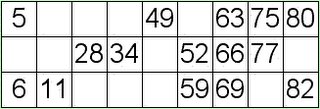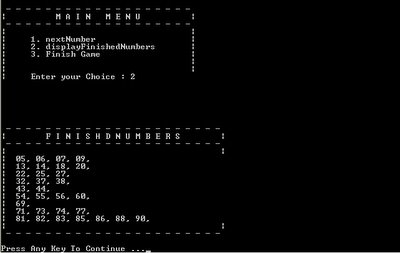Housie, Tambola, Bingo Source Code - ( Digitalized )
This site has been moved to http://www.99applications.com
To download code/application click the following link 99applications.com/java_programs and you can also find many c and c plus plus common programs in C & C++ section
Housie is a gambling game played in New Zealand, Australia, and Northern Britain (Southern Britain call it Bingo), where players mark off numbers on a ticket as they are randomly called out. It is very similar to the American game Bingo, however the tickets and the calling are slightly different.
A typical housie ticket is shown to the right. It contains fifteen numbers, arranged in nine
 columns by three rows. Each column contains either one, two, or very rarely three, numbers. The first column contains numbers from 1 to 9, the second column numbers from 11 to 19, the third 20 to 29 and so on up until the last column, which contains numbers from 80 to 90, the 90 being placed in this column as well). When players first come to the venue (often a church hall, rugby club or other place with sufficient tables and chairs) they must buy tickets or book of tickets. A book usually contains fifty tickets which are played over the course of the night. Players generally play between one and six books. At many venues, special "Super Housie" tickets, usually with much larger prizes, are also played at various times throughout the session. The game is presided over by a caller, whose job it is to call out the numbers and check winning tickets. He will announce the prize or prizes for each game before starting. The two ways of winning a prize are:
columns by three rows. Each column contains either one, two, or very rarely three, numbers. The first column contains numbers from 1 to 9, the second column numbers from 11 to 19, the third 20 to 29 and so on up until the last column, which contains numbers from 80 to 90, the 90 being placed in this column as well). When players first come to the venue (often a church hall, rugby club or other place with sufficient tables and chairs) they must buy tickets or book of tickets. A book usually contains fifty tickets which are played over the course of the night. Players generally play between one and six books. At many venues, special "Super Housie" tickets, usually with much larger prizes, are also played at various times throughout the session. The game is presided over by a caller, whose job it is to call out the numbers and check winning tickets. He will announce the prize or prizes for each game before starting. The two ways of winning a prize are:- Full House - covering all fifteen numbers on the card.
- Line - covering a horizontal line of five numbers on the card. In bonus (Super Housie) games, often three lines may be claimed - top, middle and bottom.
The caller will then say "Eyes down" to indicate that he is about to start. He then begins to call numbers as they are randomly selected, either by an electronic device or by drawing counters from a bag. The calling is generally very fast, with generally one number called per second, can be customized ( 5 seconds ).
As each number is called, players check to see if that number appears on their tickets. If it does, they will mark it.When all the numbers required to win a prize have been marked off, the player calls out "Line" or "House" depending on the prize, and an official will come and call out the numbers on the ticket. The caller will check to see if each number has been called, and if it has, he will say "House correct - please pay out". if not correct, he will say "Bogus..", and ticket is no more useful.
Business of Housie:
In New Zealand and Australia, housie is often used a fundraiser by churches, sports teams, and other groups, and raffles are sold before the game.
Housie or Bingo is an expanding and highly profitable business in the UK, with many companies competing for the customers' money.
These been.
- Gala Bingo Clubs
- Mecca Bingo Clubs
As well as offering the familiar Housie/Bingo played by marking numbered books, most large clubs have their tables modified for the playing of cash housie. (Coin slots.) This is highly profitable for the operator, with a typical "take" of fifty percent of the stake.
Caller Slang:
When calling, the caller will usually say both digits on their own first, and then the number itself, for example, three-two, thirty-two. Some callers will use many of these slang terms, others just a few. However, "Kelly's Eye", "Legs Eleven" and "Top of the Shop" are often used, even if none of the others are.
- Number 1 is "Kelly's Eye".
- A number between 1 and 9 is called "Number 1, on it's own".
- Number 10 is "One-oh, Dowling Street".
- Number 11 is "All the ones, legs eleven".
- Number 12 is "One-two, just the doz".
- Any number ending in a zero (20, 30, 40 etc) is called "Two-oh, blind twenty".
- Any number consisting of two identical numerals (22, 33, 44 etc) is "Twenty-two, all the twos".
- Number 45 is "Halfway there".
- Number 69 is "Dinner For Two Sixty Nine"
- Number 88 is "Two Fat Ladies Eighty Eight
- Number 90 is "Top of the Shop".
Now, my Work of Getting Housie Going:
Following are some of the outputs of the Thamboa Program, Have a look of it...
Download Free Java Source Code For Thambola here....
 Caller's Board
Caller's Board Displaying Finished Numbers
Displaying Finished Numbers Generating Tickets
Generating TicketsGive feedback to improve :)
http://free-source-code.blogspot.com


